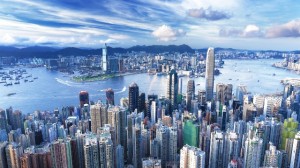The following is from my pre-blog archives. When I lived in Hong Kong in 1997, I was asked to write a semi-regular column under the banner “Postcard from Hong Kong” for a university newspaper in New Zealand. This article appeared on July 4 1997, three days after the United Kingdom transferred sovereignty of Hong Kong back to China. Given current events in Hong Kong, it’s interesting to look back at some of the comments and predictions I made at the time.
Postcard from Hong Kong
July 4, 1997
 Sovereignty of Hong Kong has been restored to China and Britannia has sailed off into the dark of night carrying its precious cargo of Prince Charles and Hong Kong’s 28th and last Governor, Chris Patten. As a New Zealander and recent arrival on a tiny island – smaller than Lake Taupo – in Southern China, it wasn’t until I heard the speeches of these two distinguished gentlemen and saw this magnificent old ship sail out through the passage between Kowloon and Hong Kong Island that it dawned upon me how significant this moment really was. This realization was reinforced as the People’s Liberation Army troops moved in with their armoured vehicles, whose only purpose is to quell civil disobedience. Sovereignty of a territory of over 6 million people and 1,095 square kilometres of land has been transferred from one country to another, each having very different cultures, values, histories, and customs. Some degree of change is inevitable.
Sovereignty of Hong Kong has been restored to China and Britannia has sailed off into the dark of night carrying its precious cargo of Prince Charles and Hong Kong’s 28th and last Governor, Chris Patten. As a New Zealander and recent arrival on a tiny island – smaller than Lake Taupo – in Southern China, it wasn’t until I heard the speeches of these two distinguished gentlemen and saw this magnificent old ship sail out through the passage between Kowloon and Hong Kong Island that it dawned upon me how significant this moment really was. This realization was reinforced as the People’s Liberation Army troops moved in with their armoured vehicles, whose only purpose is to quell civil disobedience. Sovereignty of a territory of over 6 million people and 1,095 square kilometres of land has been transferred from one country to another, each having very different cultures, values, histories, and customs. Some degree of change is inevitable.
Before July 1, I attended a debate entitled “Can Hong Kong Journalism Survive the Handover?” A number of well known journalists – expatriates and Hong Kong Chinese – spoke to the topic. The verdict at the end of it all seemed to be that it will, but in a different shape than before. In fact, this transformation had already begun. Reporters were already exercising self-censorship so as not to upset the mainland and some had been receiving threatening phone calls from the Chinese government.
One person who spoke in the debate argued that it didn’t really matter whether Hong Kong journalism survived or not. He suggested that what it had already – a freedom to report events as journalists saw fit, amongst other things – wasn’t necessarily all that great anyway. What people really care about, he said, is whether they have full bellies. During question time, I made the comment that one important thing journalism dealt in was the market for ideas. I suggested that the transformation of New Zealand from a dunce of the OECD to the head of the class may not have been possible without a free media to report and debate the reforms. (Of course, others might suggest that at times the media impeded some of the progress New Zealand made from 1984.) When unemployment stands at nearly 12%, as ours once did, the ability of a country to turn this around will directly impact upon the number of empty bellies its citizens have.
Although unemployment here is less than 3% and falling, contrary to popular opinion, Hong Kong isn’t a bastion of the free-market. It’s certainly close to it. However, there are many areas it is lagging behind in and in some cases New Zealand is doing a lot better. Take the post office, for example. It is remarkably similar to what New Zealand’s looked like pre-SOE. Queues are enormous, service is surly, there are few places to purchase stamps outside of post offices – which are few and far between – and there are different counters for different types of services, with tellers sitting idly at one group of counters while massive lines form at others. Hong Kong also falls behind New Zealand in the electricity and telecommunications industries, and it has similar troubles to New Zealand in its education and health systems, though not of the same magnitude as back home.
So what does the future hold for Hong Kong? Most people believe it will be business as usual, but political freedoms look likely to be curbed. I for one tread more cautiously around the police and any PLA soldiers I see, as China re-exerts its authority in the territory. There will be disagreements between the Chinese Government and the Hong Kong administration, but “the hope must be that they will be pebbles on the road and not potholes”, as the South China Morning Post said in an editorial on 1 July. And if the media retains a degree of freedom, it might assist Hong Kong in turning around its disappointing performance in the areas I have mentioned above. The same editorial held out a beacon of light which indicates to me that it can: “Hong Kong has an extraordinary life force. Like bamboo, it may sometimes bend, but it never snaps – and its ability to spring back from adversity is unparalleled.”
Leave a Reply
You must be logged in to post a comment.